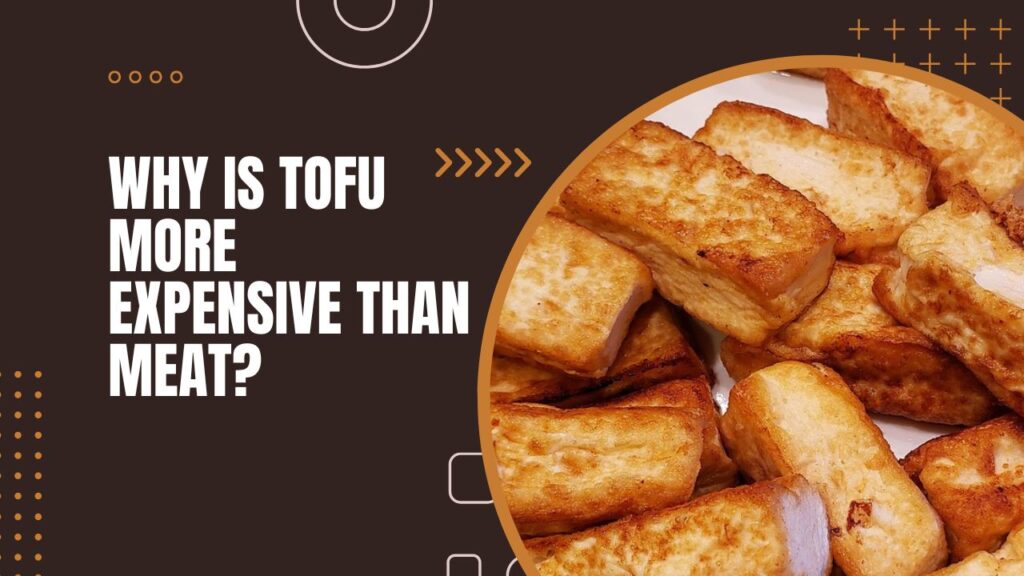Why Is Tofu More Expensive Than Meat? Tofu can be more expensive than meat in some areas due to limited local production and high import costs, despite its lower production cost compared to livestock.
Tofu, a popular plant-based protein, has been a staple in many diets around the world, particularly in Asia.
Known for its versatility and health benefits, tofu has gained significant traction in Western markets as more people adopt plant-based diets.
However, a surprising trend has emerged: in some regions, tofu can be more expensive than meat.
This raises a fascinating question—why would a product derived from soybeans sometimes outprice traditionally more resource-intensive animal proteins?
Let’s delve into the factors that influence the cost of tofu and how it compares to meat. [Why Is Tofu More Expensive Than Meat?]
What Is Tofu?
History and Origin of Tofu
Tofu, also known as bean curd, has a rich history that dates back over 2,000 years to ancient China. Legend has it that a Chinese prince accidentally discovered tofu by mixing soy milk with a natural coagulant.
Since then, tofu has spread throughout East Asia and become a staple in countries like Japan, Korea, and Vietnam. Over time, it has also gained popularity in Western countries, especially among vegetarians and vegans.
Nutritional Value of Tofu
Tofu is highly regarded for its impressive nutritional profile. It is an excellent source of plant-based protein and provides all nine essential amino acids.
Additionally, tofu is rich in minerals like calcium, magnesium, and iron, while being low in calories and cholesterol-free.
These qualities make it a go-to option for those seeking a healthy and sustainable protein source. [Why Is Tofu More Expensive Than Meat?]
What Contributes to the Cost of Tofu?
Production Costs
At first glance, tofu might seem like an inexpensive product since it is made from soybeans, a relatively affordable crop.
However, the process of making tofu is labor-intensive and involves multiple steps, including soaking, grinding, boiling, coagulating, and pressing.
Each of these steps requires time, specialized equipment, and energy, which can drive up production costs.
Moreover, the cost of raw materials like organic soybeans or non-GMO soybeans can be higher, especially in regions where such standards are in demand.
Producers often pass these costs on to consumers, contributing to the higher price of tofu. [Why Is Tofu More Expensive Than Meat?]
Supply Chain Factors
In regions where tofu isn’t widely produced, supply chain factors play a significant role in its pricing. Imported tofu incurs additional costs for transportation, tariffs, and distribution.
Furthermore, tofu is a perishable product, which means it requires careful handling and refrigeration during transport.
All these factors can increase the retail price of tofu in markets where it isn’t produced locally. [Why Is Tofu More Expensive Than Meat?]
Regional Demand and Availability
The availability and demand for tofu vary widely across different regions. In East Asia, tofu is a common dietary staple, and its widespread production keeps prices low.
However, in Western countries, tofu is often viewed as a niche product. Limited production and lower demand result in higher prices due to the lack of economies of scale.
Why Meat Is Often Cheaper
Mass Production of Meat
The global meat industry is a massive operation. Industrial farming methods allow for the mass production of meat at relatively low costs.
Large-scale operations use efficient breeding, feeding, and processing techniques to produce meat quickly and in large quantities. This high volume significantly reduces the per-unit cost of meat.
Government Subsidies
In many countries, governments provide subsidies to the meat industry to support farmers and stabilize food prices.
These subsidies cover costs such as feed, infrastructure, and veterinary services, effectively lowering the retail price of meat.
In contrast, plant-based products like tofu often do not benefit from similar financial support.
Established Infrastructure
The meat industry has a well-established infrastructure, including advanced processing facilities, distribution networks, and retail partnerships.
This infrastructure ensures that meat products are readily available and competitively priced. [Why Is Tofu More Expensive Than Meat?]
On the other hand, the tofu industry, particularly in regions where it’s less common, lacks such extensive systems, contributing to higher costs.
Comparative Costs: Tofu vs. Meat
While tofu is often marketed as a budget-friendly alternative to meat, its price can vary significantly depending on location and market conditions.
In regions with high tofu consumption, such as East Asia, tofu is generally cheaper than meat due to large-scale production and efficient distribution.
However, in Western markets, tofu can sometimes surpass the cost of affordable meat cuts like chicken thighs or ground beef. [Why Is Tofu More Expensive Than Meat?]
This is particularly true for specialty tofu products, such as organic or flavored varieties, which often come at a premium price.
The Role of Consumer Preferences
Consumer behavior plays a crucial role in determining the price of tofu and meat. As plant-based diets become more popular, the demand for tofu and other meat alternatives is growing.
However, tofu still occupies a niche market in many regions, which limits its production scale and keeps prices high.
In contrast, meat remains a dietary staple for the majority of the global population. [Why Is Tofu More Expensive Than Meat?]
This widespread consumption supports high production volumes and intense competition among suppliers, driving prices down.
Additionally, cultural preferences and dietary habits heavily influence consumer choices, which in turn affect market prices.
Environmental and Ethical Considerations
Environmental Impact
Tofu is often lauded for its lower environmental footprint compared to meat. Producing tofu requires significantly less water and land and generates fewer greenhouse gas emissions.
As environmental concerns become more prominent, some consumers are willing to pay a premium for tofu as a sustainable alternative to meat.
Ethical Concerns
Ethical considerations also contribute to tofu’s appeal. The production of tofu involves no harm to animals, making it an attractive choice for vegetarians, vegans, and those concerned about animal welfare.
This ethical alignment can justify a higher price for many consumers, who view it as an investment in their values. [Why Is Tofu More Expensive Than Meat?]
Future Trends
The price dynamics of tofu and meat are likely to evolve as market conditions change. With increasing awareness of the health and environmental benefits of plant-based diets, the demand for tofu is expected to grow.
This could encourage more investment in tofu production, leading to improvements in efficiency and scalability, ultimately reducing costs.
Conversely, the meat industry faces challenges such as rising feed costs, environmental regulations, and shifting consumer preferences.
These factors could lead to higher meat prices in the future, making tofu and other plant-based proteins more competitive. [Why Is Tofu More Expensive Than Meat?]
See Also: Why Is The US Mint So Expensive?
Final Verdict
Tofu’s price relative to meat is influenced by a complex interplay of factors, including production methods, supply chain dynamics, consumer demand, and regional availability.
While tofu is generally less expensive than premium cuts of meat, it can be more costly than some affordable meat options in specific markets.
Understanding these factors helps consumers make informed choices that align with their health, budget, and values.
FAQs
Is tofu healthier than meat?
Tofu is a heart-healthy option, offering high-quality protein without cholesterol. However, meat provides essential nutrients like vitamin B12 and heme iron, which are not naturally present in tofu.
Why is tofu cheaper in some countries?
In countries where tofu is a dietary staple, such as China and Japan, large-scale production and widespread consumption keep prices low.
Can tofu production become more cost-efficient?
Yes, as demand for tofu grows, advancements in technology and production methods are likely to reduce costs over time. [Why Is Tofu More Expensive Than Meat?]
How do tofu and meat compare in terms of environmental impact?
Tofu has a significantly lower carbon footprint and uses fewer resources like water and land compared to meat, making it a more sustainable choice.
What are some affordable tofu alternatives?
Other plant-based proteins like tempeh, seitan, lentils, and chickpeas offer similar nutritional benefits at varying price points.
Conclusion: Why Is Tofu More Expensive Than Meat?
Tofu’s pricing compared to meat varies based on production, demand, and regional factors.
While tofu offers numerous health, environmental, and ethical benefits, its cost can sometimes exceed that of meat in certain markets.
As the plant-based movement continues to grow, we may see shifts in pricing dynamics that make tofu a more accessible option for all.
Ultimately, whether you choose tofu or meat, it’s essential to consider both the financial and nutritional value that each brings to your table.

Hello, I’m Ashlyn Fleming from Sedona, Arizona. After finishing my Master’s, I noticed rising prices on everything I buy for my family. Curious about why, I started a blog to share my findings with friends and family.
